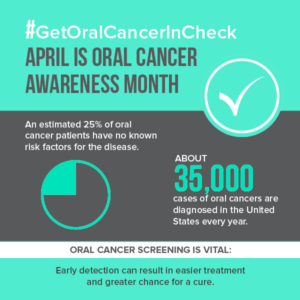Uncategorized |3 min read
Get Oral Cancer In Check ‐ April is Oral Cancer Awareness Month
As your Ballard dentist, Dr. Dominick Curalli is committed to the health and well‐being of the mouths in our community! As you already know, regular cleanings and checkups are vitally important to maintain healthy teeth and gums. However, in addition to fighting plaque, regular checkups can also help you and your family fight oral cancer.
April is Oral Cancer Awareness Month
There are an estimated 35,000 cases of oral cancers diagnosed in the United States every year. On average, 60 percent of those with the disease will survive more than five years.
There are an estimated 35,000 cases of oral cancers diagnosed in the United States every year. On average, 60 percent of those with the disease will survive more than five years.
Causes & Risks of Oral Cancer
• Tobacco use: Smokers are six times more likely than non‐smokers to develop oral cancer. Smokeless tobacco (chewing tobacco) increases the risk of these cancers by about 50 times.
• Tobacco use: Smokers are six times more likely than non‐smokers to develop oral cancer. Smokeless tobacco (chewing tobacco) increases the risk of these cancers by about 50 times.
• Alcohol use: The combination of tobacco and alcohol can greatly increase risk.
• Poor nutrition.
• Poor nutrition.
• HPV (Human Papillomavirus).
Symptoms of Oral Cancer
Common symptoms of oral cancer:
• A sore in the mouth that lasts for more than two weeks.• Persistent pain, numbness, bleeding, or swelling in the mouth.
Common symptoms of oral cancer:
• A sore in the mouth that lasts for more than two weeks.• Persistent pain, numbness, bleeding, or swelling in the mouth.
• Lump or thickening in the cheek, gums, lips, or elsewhere in the mouth.
• White or red patch on the gums, tongue, tonsil, or elsewhere in the mouth.
• Persistent sore throat.
• Swelling and/or difficulty moving the jaw.
• Loose teeth.
While many of these symptoms may not be related to oral cancer, if you’re at higher risk and you experience any of these issues for more than two weeks, discuss them with
While many of these symptoms may not be related to oral cancer, if you’re at higher risk and you experience any of these issues for more than two weeks, discuss them with
Dr. Curalli right away.
During your scheduled hygiene appointment, we will complete a six‐step oral cancerscreening:
Step 1: Tongue. We will ask you to extend your tongue as far as it can go so we can examine the sides and underside for white and red patches and/or lumps.
Step 1: Tongue. We will ask you to extend your tongue as far as it can go so we can examine the sides and underside for white and red patches and/or lumps.
Step 2: Lips and Cheek. We will feel for lumps or bumps, looking for white or red areas that should not be there.
Step 3: Double‐Digit Probe. Using two fingers, we examine the floor of your mouth, feeling for lumps, and looking for white and red patches.
Step 4: Palate. We check the roof of your mouth for lumps, areas of softness on the hard palate, and white and red patches.
Step 5: Neck. We feel your neck for enlarged lymph nodes, which could indicate infection.
Step 6: Tonsils. Using a dental mirror, we thoroughly examine your tonsils for enlargement, redness, and/or bumps.
How to Prevent Oral Cancer
If you smoke or use chewing tobacco, the best way to prevent this deadly cancer is toquit. For assistance quitting, visit http://smokefree.gov.
Performing a self‐examination regularly increases the chance of identifying changes or new growths early. If you spot anything unusual in your mouth or if you persistently experience any of the symptoms listed above, call us at 206-784-6310 right away.
Additionally, keeping up with regular cleanings can help you stay in tune with the overallhealth of your teeth, gums, and mouth as a whole. Schedule your next appointment today at 206-784-6310!
Sources: https://www.aaoms.org/docs/media/oralcancerfacts.pdfhttp://www.idph.state.il.us/cancer/factsheets/oralcancer.htmhttp://www.mayoclinic.org/tests‐procedures/oral‐cancer‐screening/basics/definition/prc‐20110761http://www.sixstepscreening.org
If you smoke or use chewing tobacco, the best way to prevent this deadly cancer is toquit. For assistance quitting, visit http://smokefree.gov.
Performing a self‐examination regularly increases the chance of identifying changes or new growths early. If you spot anything unusual in your mouth or if you persistently experience any of the symptoms listed above, call us at 206-784-6310 right away.
Additionally, keeping up with regular cleanings can help you stay in tune with the overallhealth of your teeth, gums, and mouth as a whole. Schedule your next appointment today at 206-784-6310!
Sources: https://www.aaoms.org/docs/media/oralcancerfacts.pdfhttp://www.idph.state.il.us/cancer/factsheets/oralcancer.htmhttp://www.mayoclinic.org/tests‐procedures/oral‐cancer‐screening/basics/definition/prc‐20110761http://www.sixstepscreening.org



Thank you for the information on oral cancer, in addition to the current functional foods from Japan to support effective cancer treatment, called King Fucoidan Japan, you can see more on our website.